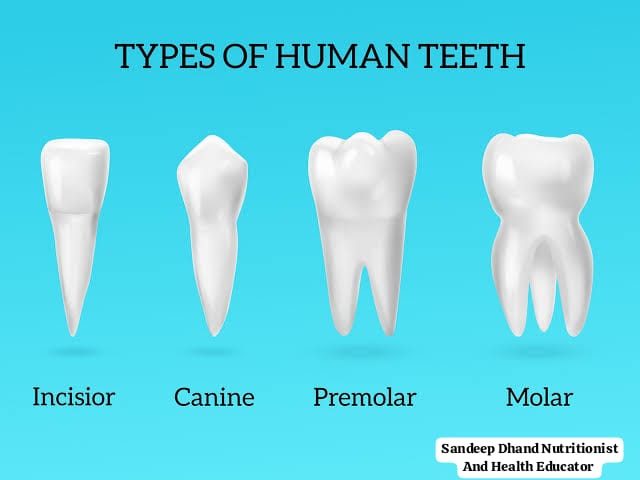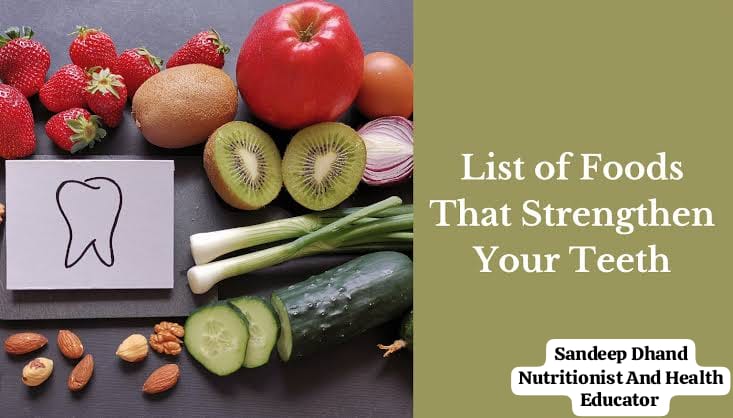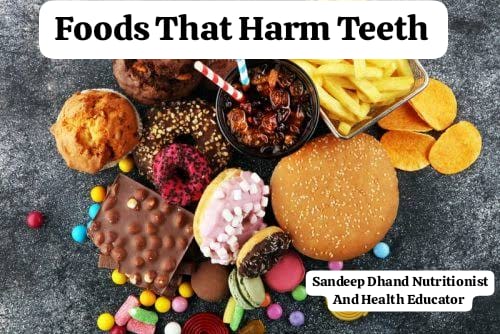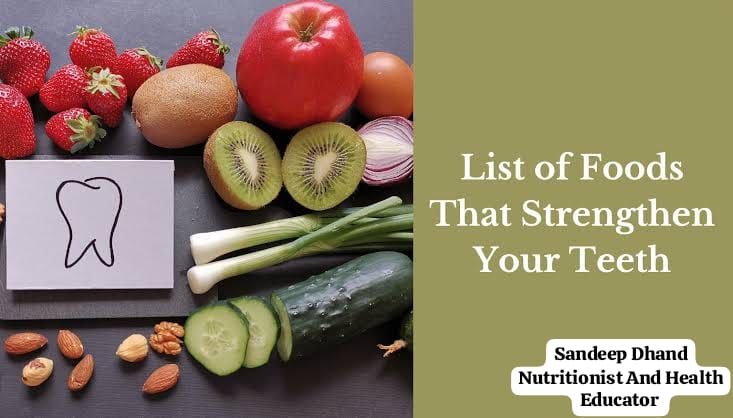Sandeep Dhand
Nutritionist And Health Educator
Teeth are important for chewing food, speaking clearly, and maintaining a confident smile. However, many people face dental issues like cavities, weak gums, or sensitivity. While brushing and flossing are important, the role of food in keeping teeth healthy is often overlooked. A good diet not only protects teeth but also helps them stay strong. But can a good diet fix damaged teeth? Let’s explore how food impacts dental health and whether it can repair teeth naturally.
Understanding Your Teeth

Before learning about how food helps, it’s important to understand the structure of teeth. Each tooth has the following parts:
- Enamel: The hard, outer layer that protects the tooth.
- Dentin: The layer under the enamel, softer and sensitive to damage.
- Pulp: The center of the tooth, containing nerves and blood vessels.
- Cementum: Covers the roots of teeth, helping them stay in place.
- Gums: Surround the base of the teeth, keeping them healthy and stable.
If teeth are not cared for, problems like cavities, weak gums, or tooth loss can occur.
How Food Affects Teeth
Your diet has a big impact on your teeth. Certain foods help make teeth stronger, while others can cause damage.
Foods That Strengthen Teeth

Calcium-Rich Foods: Help build strong enamel and prevent decay.
Examples: Milk, cheese, yogurt, almonds, leafy greens.
Vitamin C Foods: Protect gums and prevent bleeding or infections.
Examples: Oranges, strawberries, bell peppers, broccoli.
Phosphorus-Rich Foods: Work with calcium to repair teeth.
Examples: Fish, eggs, nuts, beans.
Fiber-Rich Foods: Clean teeth naturally and increase saliva flow.
Examples: Apples, carrots, celery.
Foods That Harm Teeth

Sugary Foods: Cause cavities by feeding bacteria in the mouth.
Examples: Candy, cookies, soda.
Acidic Foods: Erode enamel and make teeth sensitive.
Examples: Citrus fruits (in large amounts), vinegar, soda.
Sticky Foods: Stay on teeth for a long time, increasing the risk of decay.
Examples: Toffee, dried fruits.
Can Food Repair Teeth Naturally?
The ability of food to repair teeth depends on the type of damage. Let’s look at what a good diet can and cannot fix:
What Food Can Fix
- Enamel Weakness
Enamel can repair itself in the early stages of damage if the diet includes calcium and phosphorus. This process is called remineralization.
- Sensitive Teeth
Foods rich in vitamins and minerals can strengthen teeth, reducing sensitivity.
- Gum Inflammation
Vitamin C and anti-inflammatory foods can improve gum health and reduce swelling or bleeding.
What Food Cannot Fix
- Cavities
Once a cavity forms, it cannot heal on its own. Dental fillings or treatments are needed.
- Cracks or Chips
Physical damage like a cracked or broken tooth requires a dentist’s care.
- Severe Gum Disease
Advanced gum problems need professional treatment.
Best Foods for Healthy Teeth

Here is a detailed list of foods that are great for dental health:
- Dairy Products
Why: High in calcium and phosphorus, which strengthen enamel.
Examples: Milk, cheese, yogurt.
Tip: Cheese helps neutralize acids in the mouth, reducing the risk of decay.
- Leafy Greens
Why: Packed with calcium and folic acid for strong teeth and healthy gums.
Examples: Spinach, kale, collard greens.
Tip: Add them to smoothies or salads for easy consumption.
- Crunchy Fruits and Vegetables
Why: Scrub teeth naturally and increase saliva, which cleans the mouth.
Examples: Apples, carrots, celery.
Tip: Snack on these instead of sugary treats.
- Nuts and Seeds
Why: Provide minerals like magnesium and calcium to protect enamel.
Examples: Almonds, sesame seeds, sunflower seeds.
Tip: Eat a handful of nuts daily for a quick nutrient boost.
- Fatty Fish
Why: Rich in vitamin D, which helps the body absorb calcium.
Examples: Salmon, mackerel, sardines.
Tip: Include fish in your meals 2-3 times a week.
- Green and Black Tea
Why: Contain polyphenols that reduce bacteria and plaque.
Tip: Drink unsweetened tea to avoid adding sugar.
- Water
Why: Washes away food particles and keeps the mouth hydrated.
Tip: Rinse your mouth with water after eating to remove debris.
Foods to Avoid for Healthy Teeth
To keep your teeth healthy, it’s important to limit these foods:
- Sugary Snacks: Promote bacteria that cause cavities.
- Acidic Drinks: Erode enamel over time.
- Hard Candies: Risk cracking teeth and lingering sugar in the mouth.
- Starchy Foods: Turn into sugar and stick to teeth.
How to Maintain Healthy Teeth with a Good Diet
Follow these tips to ensure your diet supports your dental health:
- Eat Balanced Meals
Include a variety of foods like proteins, whole grains, fruits, and vegetables. - Snack Smart
Choose healthy snacks like nuts or crunchy vegetables instead of sugary or processed foods. - Drink Water Regularly
Stay hydrated and rinse your mouth with water after meals. - Limit Sugary and Acidic Foods
Enjoy sweets or acidic drinks occasionally, not daily. - Chew Sugar-Free Gum
Stimulates saliva, which protects teeth and gums.
The Role of Supplements
For people who struggle to get enough nutrients from food, supplements can help:
Calcium: Supports strong teeth and bones.
Vitamin D: Helps the body absorb calcium effectively.
Vitamin C: Maintains healthy gums.
Magnesium: Strengthens enamel and prevents decay.
Always consult a doctor or nutritionist before starting supplements.
Common Myths About Diet and Teeth
- Myth: Brushing is enough to keep teeth healthy.
Fact: Diet is equally important for strong teeth and gums.
- Myth: Acidic fruits like lemons are bad for teeth.
Fact: When eaten in moderation, they provide vitamin C, which benefits gums.
- Myth: Dairy is the only source of calcium.
Fact: Non-dairy options like almonds, tofu, and broccoli also provide calcium.
When to See a Dentist
While a good diet is essential, it is not a replacement for professional dental care. Visit a dentist if you experience:
Persistent pain or sensitivity.
Bleeding gums.
Cavities or visible damage to teeth.
Problems with wisdom teeth.
Conclusion
Good food is the foundation of strong and healthy teeth. A balanced diet rich in calcium, vitamins, and fiber can protect your teeth, strengthen enamel, and support gum health. While food cannot reverse severe damage like cavities or cracks, it plays a key role in preventing problems and maintaining oral health.
Combine a healthy diet with daily brushing, flossing, and regular dental visits for the best results. Remember, your smile reflects your overall health—so take care of it by eating well and practicing good oral hygiene!
